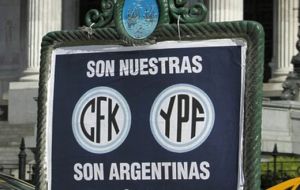MercoPress. South Atlantic News Agency
S&P downgrades Argentina’s outlook to ‘negative’ spurred by policies enacted since October 2011
 Seizure of YPF ‘exacerbate existing weaknesses in Argentina's economy, including high inflation and rigid government expenditure’
Seizure of YPF ‘exacerbate existing weaknesses in Argentina's economy, including high inflation and rigid government expenditure’ Rating Agency Standard and Poor’s (S&P) downgraded Argentina’s economic and financial outlook to “negative,” after the expropriation of YPF, which endangers the “B” rating the country has for its sovereign debt.
“In our view, the recent government policies could increase risks to Argentina's macroeconomic framework, squeeze its external liquidity, and hinder medium-term growth prospects,” the agency stated in a communiqué.
That is the reason why it “revised the outlook on the Republic of Argentina to negative from stable,” it continued.
The negative outlook indicates at least a one-in-three chance of a downgrade this year or next. A worsening external position, mostly likely from financial outflows (perhaps combined with weakening terms of trade) or additional policy actions that further diminish Argentina's growth prospects could lead to a downgrade.
Likewise “the negative outlook revision stems from policies enacted since the October 2011 presidential elections.”
“These include rising restrictions to international trade and recent steps to nationalize the hydrocarbon company YPF. We believe that these actions could exacerbate the existing weaknesses in Argentina's economy, including high inflation (which has appreciated the real exchange rate) and increasingly rigid government expenditure, and result in a worse investment climate,” it continued.
President Cristina Fernandez announced the YPF takeover last week, drawing swift retaliation from Spain and criticism from other key trade partners tired of her government's unorthodox import curbs.
S&P said Fernandez's move to expropriate a 51% controlling stake in YPF was taken “abruptly and unilaterally,” and said it underscored “the weakening system of checks and balances.”
Actions of this type continue to shorten the economic planning horizon in the country and contribute to Argentina's deteriorating economic and political links with the international community.
As a result, “we do not expect Argentina to progress on resolving its now long-standing impediments to regaining access to international markets, or curing the now 10-year old default to the bilateral creditors of the Paris Club”
Although Argentina has 47.6 billion dollars of international reserves as of April 13, 2012, equal to 5.5 months of current account payments, there are growing risks to the nation's external liquidity over the medium term.
The combination of a weak global economy, growing uncertainty from both foreign and local market participants, and restricted access to foreign financing could over time raise the risk of a loss of external liquidity.
High inflation contributed to a decrease in the real value of government debt (17% of which is denominated in nominal pesos and 21% linked to the official inflation rate). That, along with balanced budgets or small deficits, and rapid GDP growth, led to a decline in debt in terms of GDP.
Argentina's gross general government debt fell to 43% of GDP at the end of 2011 from 60% in 2007. In addition, the central government relies on public sector entities (in particular the social security system, nationalized in 2008, and the Central Bank) to refinance maturing market debt, a policy that has moderated its rollover risk.
“This policy, however, is expected to face limits over time as these entities' own public missions are compromised by accumulating large levels of government debt instruments whose real value is not protected from inflation's effect. Although the government relies only moderately on private domestic markets to satisfy its borrowing requirement, we could interpret a future liability management operation as distressed under our methodology, and thus an event of default”
Argentina, Latin America's No. 3 economy, has yet to return to global credit markets a decade after it staged the biggest sovereign debt default in history.




Top Comments
Disclaimer & comment rules-

-

-

Read all commentsdowngrading? no problem for the so called “government”. how? they are already on the rock bottom. they would be concerned once somebody would certify them as “reliable”.
Apr 24th, 2012 - 07:03 am 0But hang on a minute! S&P says the UK with its AAA rating and wealthy, open and diversified economy is stable. How on earth can it be stable if the Argentine rating is negative? Every Malvinista know that the UK is “finished” and that Argentina is emerging in the new world order above the UK.
Apr 24th, 2012 - 07:09 am 0Pirates go home (froth coming out of my mouth at this stage). Give us back our oil! Not that there is any oil... Err, of course.
S&P is just another bunch of cronies in the UK's back pocket. We don't WANT to get good ratings from these criminals.
Marcos, what do you reckon? Did I capture your key points?
Chuckle chuckle.
Careful with the froth Joe, I reckon that the Malvinistas must have special waterproof and froth-proof keyboards to avoid shorting them out.
Apr 24th, 2012 - 07:26 am 0Commenting for this story is now closed.
If you have a Facebook account, become a fan and comment on our Facebook Page!